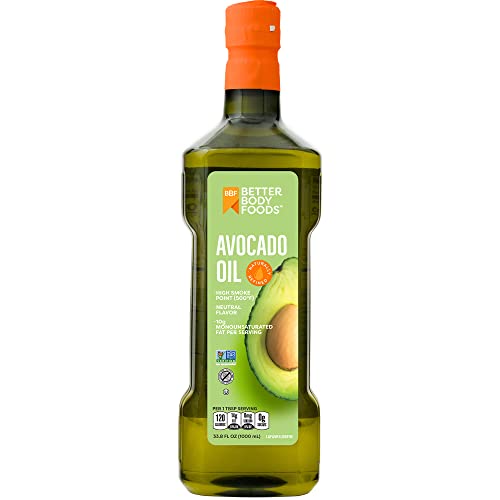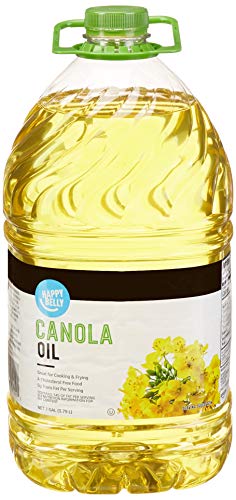Rice bran oil is commonly used in cooking dishes since it is a good source of healthy fats. Rice bran oil is a popular ingredient in recipes due to its neutral flavor and aroma. Are there alternatives to rice bran oil to try in cuisines? Yes, there are.
You can replace rice bran oil with olive oil, peanut oil, avocado oil, soybean oil, sesame oil, grape seed oil, corn oil, sunflower oil, coconut oil, and safflower oil, and canola oil. Although, each substitute may have a different smoke point and aroma.
We have included the nutritional profile of rice bran oil and advice on how to use these alternatives.
Rice Bran Oil Nutrition
These are the nutritional elements contained in a serving size of 100 grams. Per serving, Rice bran oil contains 884 calories.
| Nutritional element | Grams | Daily value |
| Total fat | 100 g | 153% |
| Saturated fat | 20g | 100% |
| Polyunsaturated fat | 0 g | – |
| Monounsaturated fat | 0g | – |
| Cholesterol | 0mg | 0% |
| Sodium | 0mg | 0% |
| Potassium | 145mg | 4% |
| Total carbohydrate | 0g | 0% |
| Dietary Fiber | 0g | 0% |
| Sugars | 0g | – |
| Protein | 0g | 0% |
| Vitamin C | – | 0% |
| Vitamin A | – | 0% |
| Vitamin B6 | – | 0% |
| Iron | – | 0% |
| Magnesium | – | 0% |
| Calcium | – | 0% |
| Cobalamin | – | 0% |
11 Rice Bran Oil Substitutes to Try Today
The following are suitable alternatives to rice bran oil when cooking:
1. Olive oil
Because olive oil is readily available in grocery stores, it is a popular substitute for rice bran oil in cooking. When frying, grilling, sautéing, or baking, you can use olive oil to replace rice bran oil.
They have a light flavor that is suitable for any cuisine and are ideal for marinades, salad dressings, and roasting vegetables. Note that there are varieties of olive oil; the ideal olive oil to use when substituting for rice bran oil is extra virgin olive oil. When using olive oil as a substitute, heat it until it shimmers but never until it reaches a smoking point.
2. Peanut oil
Another popular substitute for rice bran oil is peanut oil. Because it is low in cholesterol and helpful in preventing heart disease and managing blood sugar levels, this oil is considered a healthier option.
Unlike rice bran oil, which has a neutral flavor, peanut oil will offer a subtle nutty flavor to your food yet is suitable for all cuisines. It is important to note that even if you are allergic to peanuts, you can consume peanut oil because the proteins that cause allergies are removed during processing. Peanut oil can be used in peanut butter cookie recipes.
3. Soybean oil
Soybean oil is still one of the healthiest alternatives to rice bran oil in cooking. Soybean oil, like rice bran oil, has a neutral oil flavor, aroma, and high smoking point that makes it suitable for several meals and cooking methods. Simply use the extra ratio of rice bran oil when replacing it with soybean oil.
This oil has several health benefits. This oil has the ability to produce insulin receptors, which helps manage diabetes. Soybean oil is also effective in improving blood circulation, containing antioxidants, and treating sleep disorders.
4. Avocado oil
Another healthy option for rice bran oil in recipes is avocado oil. Avocado oil can be used as a substitute in a variety of ways, including salad dressings and smoothies, marinating meat, baking, grilling, frying, and sautéing.
Because of their versatility, they can be utilized in both hot and cold cuisines. Extra virgin avocado oil may have a stronger flavor and aroma in your dish than other types of avocado oil. When replacing avocado oil with rice bran oil in your recipe, use it sparingly.
5. Sesame oil
Sesame oil is not a popular substitute for rice bran oil, but it can be used in recipes. Sesame oil is more expensive than some alternatives. Because sesame oil lacks the neutral flavor and scent of rice bran oil, it should be used sparingly in recipes.
Because of its strong flavor, sesame oil is ideal for deep frying but should not be used for sautéing. Sesame oil is suitable for miso sauces, salads, soups, kimchi, and rice noodle recipes. Sesame oil contains compounds that can help regulate blood pressure and cholesterol levels. Also, sesame oil contains anti-inflammatory and antibacterial properties.
6. Safflower oil
Although safflower oil is more expensive than rice bran oil, it is ideal for cooking. It has a similar taste and flavor to rice bran oil. Safflower oil does not have a strong flavor that will overpower the flavor of your food.
Because the oil has a higher smoke point than other rice bran oil alternatives, it can be used in any cooking method. Safflower oil helps to control blood sugar levels, prevent inflammation and is a good source of healthy fats.
7. Grapeseed oil
Because grapeseed oil has a neutral taste and aroma similar to rice bran oil, it can be used in place of rice bran oil in cooking without changing the flavor profile of your meal. This oil is ideal for cooking at moderate and medium temperatures, such as sautéing.
It is not recommended for deep frying since it can break down in high heat applications. Grapeseed oil is suitable for salads and mayonnaise. It is also ideal for baking, searing, and sautéing. Grapeseed oil as it is a rich source of vitamin E and antioxidants.
8. Corn oil
When cooking, corn oil is a common and inexpensive substitute for rice bran oil. This oil is suited for cooking at high temperatures. You can use corn oil in bread dips, margarine preparation, and salad dressings as it is a versatile cooking and flavoring ingredient.
One of the health benefits of corn oil is its ability to lower bad cholesterol. Like rice bran oil, corn oil is a natural skin care product. Corn oil is effective in maintaining skin tones and relieves irritations and blemishes.
8. Coconut oil
Although coconut oil is a popular option for rice bran oil in recipes, it has a strong flavor that will change the aroma of your food. Due to its popularity, it is not as pricey as some of the other substitutes.
Coconut oil has several applications, including cooking, flavoring, and skin care. It is ideal for stir-fries, baked foods, and desserts. Coconut oil improves skin and hair health, has antibacterial and antioxidant qualities, and reduces Alzheimer’s disease symptoms.
10. Sunflower oil
Because sesame oil is a versatile oil, it can be used to replace rice bran oil. Sunflower oil is ideal for both cooking and skin care.
When sauteeing, searing, or frying, sesame oil can be used in place of rice bran oil. Because of its aroma, unrefined sunflower oil can also be used in salad dressings. The benefits of utilizing sunflower oil for skin care include improved skin hydration, reduced aging, and skin protection.
11. Canola oil
Canola oil can be used to replace rice bran oil in recipes due to its mild flavor and high heat tolerance, albeit it is not a common substitution. Canola oil, like rice bran oil, will not overshadow the flavor of your food if utilized appropriately.
They can be used for a variety of culinary methods, including grilling, baking, sautéing, and stir-frying. Canola oil can also be added to soups and sauces. Omega-3 and -6 fatty acids are among the many fatty acids found in canola oil, which is also a rich source of vitamins E and K.
Final note
These substitutions are ideal for enhancing dishes. Unless you don’t mind changing the flavor or aroma of your dish, it’s best to choose a rice bran oil substitute that will not have an altering effect.



















